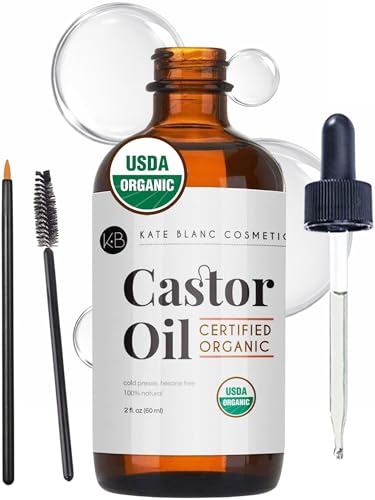Castor oil has been used for centuries in traditional medicine and beauty practices for its healing and nourishing properties. Derived from the seeds of the castor plant (Ricinus communis), this thick, nutrient-rich oil is packed with compounds believed to promote hair growth, strengthen strands, and improve scalp health.
In recent years, castor oil has gained popularity as a natural remedy for thinning hair, hair loss, and dry scalp. In this article, we’ll explore the benefits of castor oil for hair growth, how it works, and the best ways to use it for healthier, thicker hair.
What is Castor Oil?

Castor oil is a vegetable oil obtained by pressing the seeds of the castor plant. It has a thick, sticky consistency and a pale yellow color. Known for its anti-inflammatory and moisturizing properties, castor oil is commonly used in hair care, skincare, and even as a natural laxative.
Key Components Relevant to Hair Health:
- Ricinoleic Acid: A unique fatty acid that makes up about 90% of castor oil. It has anti-inflammatory properties that help improve scalp circulation, promoting healthier hair growth.
- Omega-6 and Omega-9 Fatty Acids: Nourish hair follicles, support hair strength, and reduce breakage.
- Vitamin E: A powerful antioxidant that protects the scalp from oxidative stress and free radical damage.
- Proteins and Minerals: Strengthen hair structure and promote scalp health.
These nutrients work together to create an environment conducive to hair growth and scalp wellness.
Benefits of Castor Oil for Hair
1. Moisturizes and Conditions Hair
Castor oil is an excellent natural moisturizer. Its thick consistency helps seal in moisture, making it ideal for dry, brittle, or damaged hair. Regular use can result in softer, shinier, and more manageable hair.
2. Reduces Hair Breakage and Split Ends
The fatty acids in castor oil strengthen the hair shaft, reducing breakage and preventing split ends. This helps retain hair length over time and keeps strands looking healthy.
3. Improves Scalp Health
A healthy scalp is key to strong hair growth. Castor oil has antimicrobial and anti-inflammatory properties that help combat issues like:
- Dandruff
- Dry, itchy scalp
- Fungal infections
By maintaining a clean, nourished scalp, castor oil creates the perfect conditions for hair follicles to thrive.



4. Protects Hair from Environmental Damage
Castor oil forms a protective barrier on the hair shaft, shielding it from:
- UV damage
- Pollution
- Harsh weather conditions
This barrier helps maintain the integrity of the hair, reducing the risk of damage from external stressors.
How Castor Oil Promotes Hair Growth
1. Enhances Blood Circulation to the Scalp
The ricinoleic acid in castor oil improves blood flow to the scalp. This increased circulation ensures that oxygen and nutrients reach the hair follicles, stimulating hair growth and strengthening the roots.
2. Provides Essential Nutrients to Hair Follicles
Castor oil is rich in vitamins and fatty acids that nourish the hair follicles, supporting the growth of thicker, stronger hair. It also helps maintain hydration, which is essential for preventing hair from becoming dry and brittle.
3. Balances Scalp pH and Oil Production
An imbalanced scalp pH can lead to hair thinning and loss. Castor oil helps regulate the scalp’s natural oil production and restores its pH balance, creating an optimal environment for healthy hair growth.
How to Use Castor Oil for Hair Growth
1. Direct Scalp Application
- Step 1: Warm a small amount of castor oil to make it easier to apply.
- Step 2: Part your hair into sections and apply the oil directly to the scalp using your fingertips or a dropper.
- Step 3: Gently massage the oil into your scalp for 5–10 minutes to stimulate blood flow.
- Step 4: Leave the oil on for at least 30 minutes or overnight for deep conditioning.
- Step 5: Wash your hair thoroughly with a gentle shampoo to remove the oil.
2. As a Hair Mask
- Mix 2 tablespoons of castor oil with a lighter oil like coconut oil or jojoba oil to reduce thickness.
- Apply the mixture from the roots to the ends of your hair.
- Cover your hair with a shower cap and leave it on for 1–2 hours (or overnight).
- Rinse thoroughly with shampoo.
3. In Combination with Other Oils
For enhanced benefits, combine castor oil with other natural oils:
- Coconut Oil: For deep hydration.
- Argan Oil: To boost shine and reduce frizz.
- Rosemary Oil: To further stimulate hair growth.
4. Recommended Frequency of Use
- For best results, use castor oil 1–2 times per week.
- Overuse can make hair greasy and difficult to wash out, so a little goes a long way.
Potential Side Effects and Precautions
While castor oil is generally safe, there are some precautions to keep in mind.
Possible Side Effects:
- Allergic Reactions: Some people may experience itching, redness, or rashes.
- Scalp Irritation: Due to its thick consistency, castor oil can clog pores if not washed out properly, leading to build-up or irritation.
Guidelines for Safe Use:
- Patch Test: Apply a small amount to the inner part of your arm to check for allergic reactions before applying it to your scalp.
- Dilution: Mix with a lighter oil to make it easier to apply and wash out.
- Avoid Contact with Eyes: Castor oil can cause irritation if it gets into the eyes.
If you experience any adverse reactions, discontinue use immediately and consult a healthcare professional.
Conclusion
Castor oil is a powerful, natural remedy for promoting hair growth, improving scalp health, and strengthening hair strands. Its rich content of ricinoleic acid, vitamin E, and omega fatty acids makes it highly effective for:
- ✔ Stimulating hair growth
- ✔ Reducing hair breakage and split ends
- ✔ Moisturizing the scalp and reducing dandruff
- ✔ Protecting hair from environmental damage
Tips for Best Results:
- Apply castor oil 1–2 times a week consistently.
- Combine with oils like coconut or jojoba for added benefits.
- Always perform a patch test before full application.
While results may take a few months to appear, patience and consistency are key. If you experience severe hair loss or scalp conditions, consult with a healthcare provider to rule out underlying medical issues.



Join the 7‑Day “Better Gut” Plan
Pop in your email and we’ll send Lesson 1 + the printable list.







